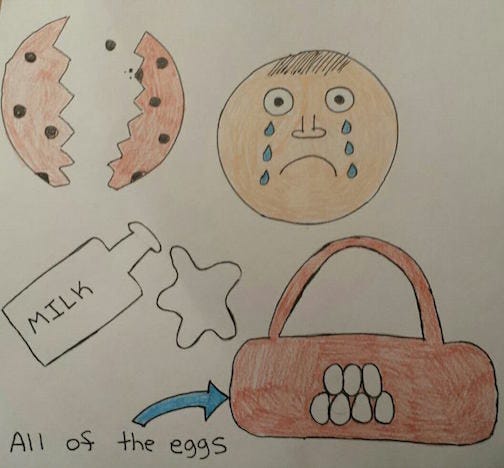
“A picture is worth a thousand words.” Can you spot the idioms in these pictures?
Recently, while substitute teaching, I’ve noticed that idioms tend to go straight over the head of each student in my classes. I first noticed this with a third grade class watching a Bill Nye video where, when using cookies to demonstrate tectonic plates, he mentions that is “how the cookie crumbles.” Bill Nye laughs; the children do not. Well, maybe they understood, but just didn’t think it was funny, I thought. Then I remembered a story from my sister, a third grade teacher at another district. After somebody literally spilled milk she said with a laugh, “Don’t cry over spilled milk.” None of the students knew what she meant. I continued to see this with other classes. When I asked a kindergarten class if they understood what the children’s author meant with the phrase “birds of the same feather,”I received blank stares (it was probably the only time they were silent the entire day).
I began to wonder, “Are idioms dying?” If they are, “Is that bad?” What would happen if, within the next few generations, many of our idioms were no long used or used only once in a blue moon? Part of me doesn’t believe it’s possible -I hadn’t even planned to use the idiom about idioms going straight over students’ heads, it came naturally. They surround us and are repeated constantly. Yet, I still wonder what would happen if they left.
On the one hand, idioms became popular for a reason. They present people with a visual to help them understand what they mean. When somebody says “every cloud has a silver lining,” you can visualize a dark cloud lined with a sliver of silver. Idioms also make a person pause and think, which can lead to greater understanding. The first time a person hears that you shouldn’t judge a book by its cover, it is likely referring to something besides books. They have to make the connection that it means you can’t judge something based solely off of appearance. Besides, it’s fun to throw idioms at people and see them understand it like a private joke.
Idioms are Dying:
Should we mourn them?
If I offered you a penny for your thoughts would you say I’m barking up the wrong tree, and that curiosity killed the cat? Or, maybe, you wouldn’t say anything because actions speak louder than words. Depending on your age, you may or may not be familiar with those idioms. According to dictionary.com, an idiom is “an expression whose meaning is not predictable from the usual meanings of its constituent elements, as kick the bucket orhang one’s head, or from the general grammatical rules of a language, as the table round for the round table, and that is not a constituent of a larger expression of like characteristics.”
No comments:
Post a Comment